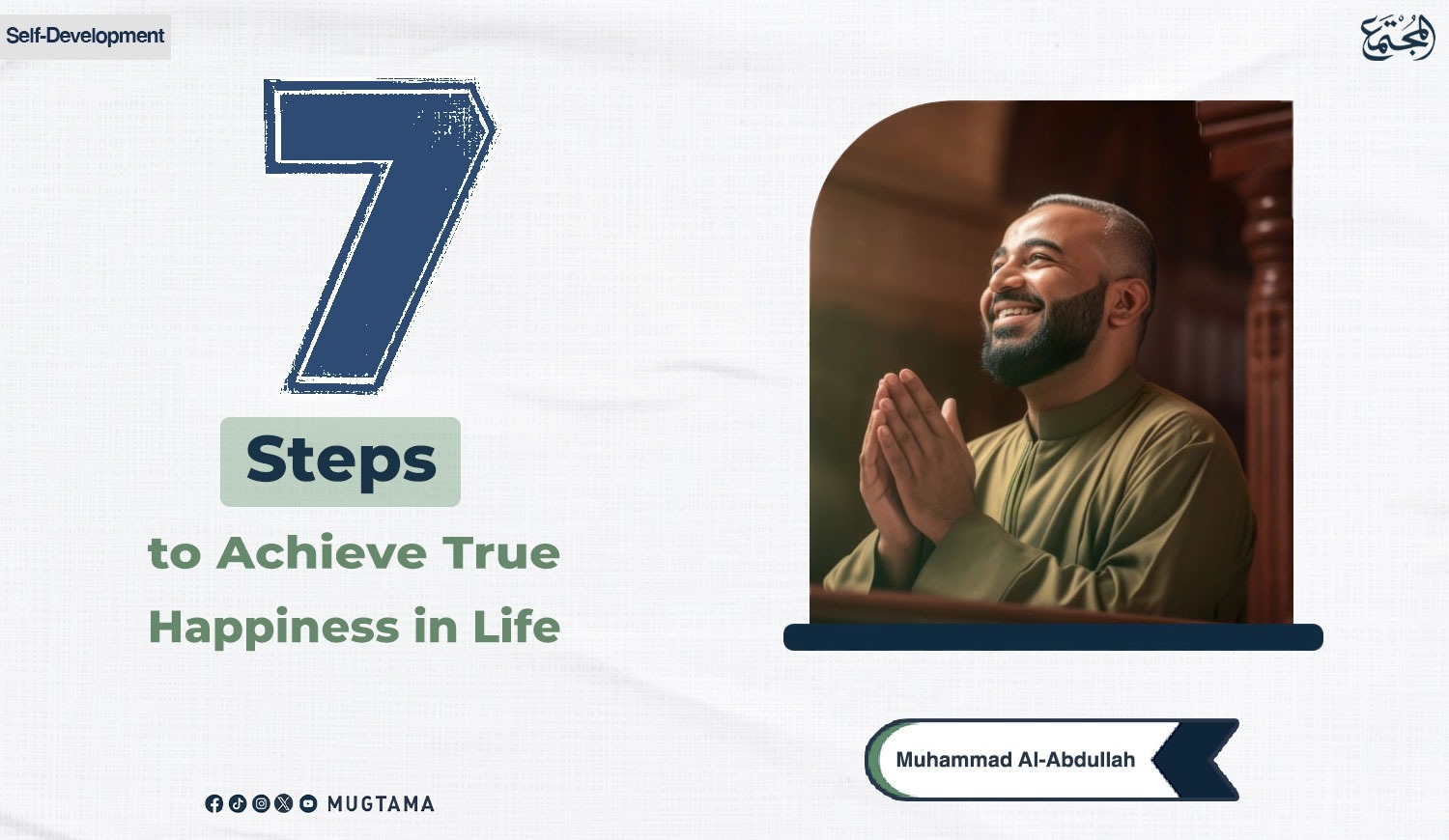7 Keys to Happiness in Islam

True Happiness in Islam: A Muslim’s Pursuit
There is no doubt that every person seeks
happiness from the moment they become aware of life until their death. A
Muslim, in particular, strives and works in this world to achieve happiness,
while also putting effort into worship from the moment they are held
accountable so as to attain the pleasure of Allah and ultimately reach the
eternal abode of happiness in the Hereafter.
What Is True Happiness in Islam?
However, the concept of happiness and the
means to attain it differ from one person to another. One may be immersed in
happiness without even realizing or enjoying it — and that is a form of divine
success, requiring a heartfelt and spiritual connection between the servant and
his Lord.
How to Be Happy: 7 Islamic Foundations That Work
To make happiness more accessible and attainable, we can outline
the most important elements that help one feel it, attain it, and enjoy the
pleasures of life without extravagance or arrogance. Among the most significant
of these are:
1- Avoiding sins Brings Light to the Soul
Indulging in sin acts as a locked gate that happiness cannot
pass through. Just as a person has both a body and a soul — with the body’s
happiness stemming from care and comfort — the soul’s happiness is through
obedience.
It has been said: "There is a void in the heart that cannot
be filled except with the remembrance of Allah."
And Allah speaks the truth: “And whoever turns away from My remembrance - indeed, he will
have a depressed life” (Taha 20: 124).
2- Persistence in righteous deeds
Righteousness is not limited to acts of worship alone; rather,
it is a way of life. A Muslim, in all his affairs — his relationships, work,
and character — must embody righteous conduct. When this becomes his path,
Allah grants him happiness and contentment, in line with His words:
“Whoever does righteousness, whether male or female, while he is
a believer – We will surely cause him to live a good life, and We will surely
give them their reward [in the Hereafter] according to the best of what they
used to do” (An-Nahl 16: 97).
3- Embracing Life’s Ups and Downs with Faith
It is important for one to understand this reality, as it
enables resilience in facing crises and obstacles. Wealth is not permanent, nor
is poverty. A healthy body may suddenly fall ill, and an ill person may
recover.
Belief in this principle is vital for overcoming hardship and
achieving happiness by recognizing that no crisis is everlasting.
It is said: everything begins small and grows — except hardship;
it begins large and then shrinks. For the reflective, the mere presence of a
hardship carries within it the happiness of knowing that it will eventually
pass.
4- Freeing the Heart from Anxiety through Dhikr
A person may be overwhelmed with worries that cause anxiety —
this is human nature. The skill lies in liberating oneself from these concerns,
starting with the remembrance of Allah, for it is what brings tranquility to
the heart: “Unquestionably, by the remembrance
of Allah hearts are assured” (Ar-Ra’d 13: 28).
Achieving happiness in this context requires perseverance and
patience until the soul tastes the sweetness of remembrance. Just as one may
need days to get used to a new food or drink they initially disliked — but
later enjoy for its benefit — this too is a tried and true method. And what is
more beneficial to a person than peace of heart and a connection with his Lord?
5- Organizing priorities
Success in any endeavor requires planning and order. A lack of
structure causes chaos in life. Though we pray five times a day and are fully
aware that a prayer cannot be accepted before its appointed time, we often
bring upon ourselves anxiety by attempting actions prematurely or planning
inappropriately. One must ensure that worldly responsibilities do not overpower
worship — or vice versa.
6- Gratitude: The Heart of True Happiness
Gratitude
is the hallmark of true happiness, and its home is the heart. So long as
gratitude resides in the heart, happiness is realized. How do you know if
you've fulfilled your duty of gratitude or fallen short?
The standard is whether you use what Allah has given you in
obedience to Him rather than in disobedience. If you do, then you have
fulfilled your gratitude and attained happiness.
In our modern age, there is a rapid increase in means of luxury
and comfort. Using these means in obedience to Allah is the true
gateway to gratitude.
7- Considering consequences of ingratitude
Allah mentioned the stories of past nations and what befell them due to their ingratitude. Among the most notable examples is that of the people of Saba’, who lived in such luxury that a woman could spin wool and walk under the shade of trees, and fruits would fall into her basket from above. But when they denied the blessings, their lands turned barren, they lived in hardship, and were scattered and divided.
-------------------------------------------------------------
For more information on this topic, see the following articles:
- How to Thank Allah for His Blessings?
- How the Qur`an Heals Anxiety and Sadness
- Allah's Remembrance in the Age of Social MediaIstighfar or Tasbeeh: Which Brings You Closer to Allah?
- Du’a (Supplication) During Hardships











